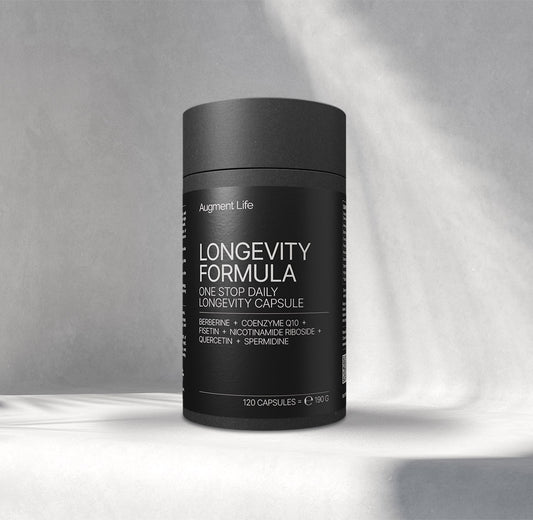Among the many different molecular pathways for longevity, the sirtuin pathway attracts a lot of attention. If you already heard about supplements nicotinamide riboside and nicotinamide mononucleotide, you might have also heard about sirtuins. They are a family of proteins that play critical roles in cellular health and longevity.
Continue reading this article to find out how sirtuins affect longevity, and how can you activate sirtuins to possibly prolong your lifespan!
What are sirtuins?
Sirtuins are a protein family of NAD+-dependent deacetylases, which means they need nicotinamide adenine dinucleotide (NAD+) to function.
There are seven known sirtuins in mammals, named SIRT1 to SIRT7. Each of these comes with different roles. They regulate various physiological processes, including metabolism, stress resistance, and genomic stability.
The sirtuin pathway actually refers to all reactions these seven sirtuins perform in different parts of our cells. These are the functions:
- SIRT1: It's located in the nucleus and cytoplasm. It regulates DNA repair, apoptosis, inflammation, and metabolic control.
- SIRT2: Found mainly in the cytoplasm and involved in cell cycle regulation and oxidative stress response.
- SIRT3, SIRT4, and SIRT5: Located in the mitochondria. These sirtuins are crucial for mitochondrial function, energy production, and metabolic regulation.
- SIRT6: Located in the nucleus, it plays a key role in DNA repair, genomic stability, and inflammation regulation.
- SIRT7: Also found in the nucleus, involved in ribosomal biogenesis and stress response.
Sirtuins and longevity
Since sirtuins participate in so many crucial cellular reactions, like DNA repair, energy production, and genomic stability, it only make sense they would be somehow involved in longevity. Interestingly, there was always a controversy with sirtuins and whether they actually have anything to do with longevity.
Today, the story is not entirely resolved. While there is a number of studies, mostly performed on animal models, that claim how activation of different sirtuins prolongs lifespan, there is also research that says otherwise (1).

Scientific research on sirtuins and longevity
For example, a famous scientific paper found that SIRT2 prolongs lifespan in flies in a similar way to calorie restriction (2). This paper has been cited more than two thousand times, and is well accepted. However, smaller and more unknown studies found that by completely removing SIRT2 from flies had absolutely no effect on their lifespan (3).
Some of the most known studies are the ones from Sinclair and Guarente, from 1997 and 2000 (4, 5), that discovered that SIRT2 prolongs replicative lifespan of yeast cells. However, this only happened to yeast cells that already multiplied several times, and these cells are very very rare in a yeast population. It is questionable how reproducible this would be in other organisms, especially humans.
Similar cases happened with many other sirtuin longevity studies, where positive results always got more attention, even if they couldn't be repeated at all. One of the most famous examples has to do with the dietary supplement resveratrol, an activator of sirtuins which the company GlaxoSmithKline intended to brand as the longevity prolongator in early 2000s.
Unfortunately, even though resveratrol and other compounds do activate sirtuins, nobody could prove that this activation has anything to do with longevity. This doesn't mean it will never be proven, but so far it hasn't been reproduced in animal models, and never researched in human clinical trials for longevity.
What supplements increase sirtuins?
After this, you might be asking yourself how to increase sirtuins, and which supplements besides resveratrol do this. Several dietary supplements have been shown to activate/increase sirtuins, or most frequently sirtuin SIRT1. These supplements will often work by increasing the levels of NAD+.
Here are the supplements that are claimed to increase sirtuin levels:
- Nicotinamide riboside (NR) - NR is a precursor to NAD+. Supplementing with NR increases NAD+ levels, which boosts sirtuin activity.
- Nicotinamide mononucleotide (NMN) - NMN is another NAD+ precursor that converts to NAD+ within cells. Higher NAD+ levels activate sirtuins and other NAD-dependent enzymes.
- Resveratrol - a polyphenol that has been shown to directly activate SIRT1.
- Quercetin - activates sirtuins and has strong antioxidant properties, that can reduce oxidative stress.
- Fisetin - has been shown to activate sirtuins and also helps clear out aged cells from the body.
- Berberine - activates AMPK, an energy sensor in cells that can enhance sirtuin activity.
- Curcumin - can indirectly activate sirtuins through its anti-inflammatory and antioxidant properties.
- Pterostilbene - structurally similar to resveratrol, and activates SIRT1 similarly to resveratrol.
Now is actually the right time to ask the crucial question, do sirtuin supplements work? What can be concluded so far is that different supplements can activate or increase the levels of sirtuins, but we don't know how or even if this activation of sirtuins can lead to a longer lifespan.
However, all of the supplements we named above have their other health benefits. For example, increasing your NAD+ levels by taking NR or NMN can significantly increase your energy levels. Berberine can induce autophagy and help with menopausal symptoms, and curcumin has anti-inflammatory properties.
On our blog, we have cover a multitude of different longevity supplements. You can read these articles here:
- What is better, NMN or NR?
- When and how should you take NMN?
- Berberine - Health Benefits, Dosage and Side Effects
- Taking Quercetin: Dosage, Tips, and Other Considerations
- Why Is Resveratrol Important?
- How much curcumin should I take and why?

FAQs
Does vitamin D activate sirtuins?
Yes, even vitamin D has been shown to influence the activity of sirtuins, particularly SIRT1.
Does exercise increase sirtuins?
Yes, exercise is known to increase the activity and expression of sirtuins (6), particularly SIRT1 and SIRT3, through these mechanisms:
- exercise increases NAD+ levels,
- exercise induces metabolic changes that activate AMPK, which can increase sirtuin activity,
- physical activity induces mild oxidative stress, which stimulates the expression of sirtuins as part of the cellular stress response.
What foods have sirtuins?
Sirtuins can hardly be absorbed through most foods, as they come in trace amounts. However, you can eat a lot of food that contains different antioxidants that can activate sirtuins. For example, you can eat food that contain quercetin, berberine, curcumin, and others.
These foods are:
- blueberries,
- green tea,
- red wine,
- turmeric,
- dark chocolate and cocoa,
- green leafy vegetables,
- apples,
- strawberries,
- citrus fruits,
- olive oil,
- nuts and seeds.
Caloric restriction is believed to slow down aging by boosting the activity of some sirtuins through activating the AMPK pathway (7). Read more about the AMPPK pathway here.
Do sirtuins repair DNA?
Yes, sirtuins play a significant role in DNA repair. Particularly, SIRT1 and SIRT6 are actively involved in maintaining genomic stability by promoting DNA repair mechanisms.
Literature sources:
- Lowe, D. (2023) Speaking of Illusions: Sirtuins and Longevity. Science.
- Rogina B, Helfand SL. Sir2 mediates longevity in the fly through a pathway related to calorie restriction. Proc Natl Acad Sci U S A. 2004 Nov 9;101(45):15998-6003. doi: 10.1073/pnas.0404184101.
- Slade JD, Staveley BE. Extended longevity and survivorship during amino-acid starvation in a Drosophila Sir2 mutant heterozygote. Genome. 2016 May;59(5):311-8. doi: 10.1139/gen-2015-0213.
- Sinclair DA, Guarente L. Extrachromosomal rDNA circles--a cause of aging in yeast. Cell. 1997 Dec 26;91(7):1033-42. doi: 10.1016/s0092-8674(00)80493-6.
- Guarente, L. (2011). Connecting the dots: linking sirtuins and AMPK in metabolism and aging. Developmental Cell 20:e1. doi: 10.1016/j.devcel.2011.04.004
- Vargas-Ortiz K, Pérez-Vázquez V, Macías-Cervantes MH. Exercise and Sirtuins: A Way to Mitochondrial Health in Skeletal Muscle. Int J Mol Sci. 2019 Jun 3;20(11):2717. doi: 10.3390/ijms20112717.
- Watroba M, Szukiewicz D. Sirtuins at the Service of Healthy Longevity. Front Physiol. 2021 Nov 25;12:724506. doi: 10.3389/fphys.2021.724506.











